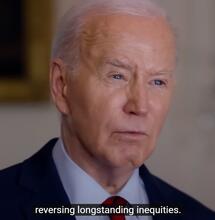What is the Clean Slate Act of 2023?

A new bipartisan congressional bill known as the Clean Slate Act of 2023 seeks to seal federal marijuana records automatically. The bill would apply to criminal records that are of non-violent, low-level nature and that are not encompassed with President Biden's pardon last October. Ultimately, the bill could help hundreds of thousands of Americans achieve greater economic stability and pursue more career opportunities.
The Clean Slate Act of 2023 measure seeks to provide relief to offenders who have been arrested on charges that did not result in a conviction. These offenses are usually not eligible for automatic sealing. The bill would allow offenders to repetition for relief two years after the court has denied their initial request. The legislation has been several sessions in the making.
In general, all "clean slate" laws revolve around the idea to provide relief for individuals with a criminal record history, allowing them to have their criminal records erased from public record systems.
"Since coming to Congress, the Clean Slate Act has been one of my top priorities," one of the measure supporters, Congresswoman Blunt Rochester representing Delaware, said in a statement. "With 9 in 10 employers conducting background checks, 4 in 5 landlords, and 3 in 5 universities doing the same, we know just how critical [it] is to give those who have served their time and paid their debt to society a clean slate and a second chance."
"As we continue to face workforce shortages impacting industries across the country and our economy, it's never been more important to do all we can to create equitable economic opportunity for millions of Americans," Rochester added. "I look forward to working with my colleagues across the aisle and across Congress to pass this much-needed legislation and send it to President Biden's desk."
President Biden issued a mass pardon for thousands of offenders at the end of 2022. However, presidential pardons are limited in the sense that they do not affect the visibility of conviction records and only affect people who've committed an offence before or on the day of the clemency action in October last year. The Clean Slate Act seeks to fill some of that gap.
"The bipartisan championship of second chances demonstrates broad agreement that a past mistake should not be a life sentence to poverty," commented Nan Gibson, executive director of the JPMorgan Chase Policy Center. "States have led the way on second chances, and now it's time for Congress to do its part."
The new bill is supported by various institutions, including JP Morgan Chase, the American Conservative Union, Center for American Progress, Clean Slate Initiative, Code for America, Justice Action Network (JAN), LinkedIn, and R Street.














